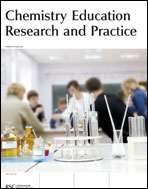Advancing Chemistry by Enhancing Learning in the Laboratory (ACELL): a model for providing professional and personal development and facilitating improved student laboratory learning outcomes
Abstract
The Advancing Chemistry by Enhancing Learning in the Laboratory (ACELL) project aims to improve the quality of learning in undergraduate laboratories through two interlocking mechanisms. The first is to build a database of experiments that are both chemically and educationally sound by testing them in a third-party laboratory, usually through an ACELL workshop involving both academic staff and students, to ensure that they work. The second mechanism provides personal and professional development for staff and students through a workshop process, and reinforced through on-going engagement with the ACELL community via the project website and experiment assessment and evaluation. The ACELL workshops include discussion of educational issues, both in abstract (through discussing laboratory learning in general) and concrete (through debriefing of each experiment tested) terms. This paper discusses the design of the ACELL project, and illustrates some of the successes of the staff and student personal and professional development aims. [Chem. Educ. Res. Pract., 2007, 8 (2), 232-254]
- This article is part of the themed collection: The Laboratory in Science Education: The State of the Art

 Please wait while we load your content...
Please wait while we load your content...